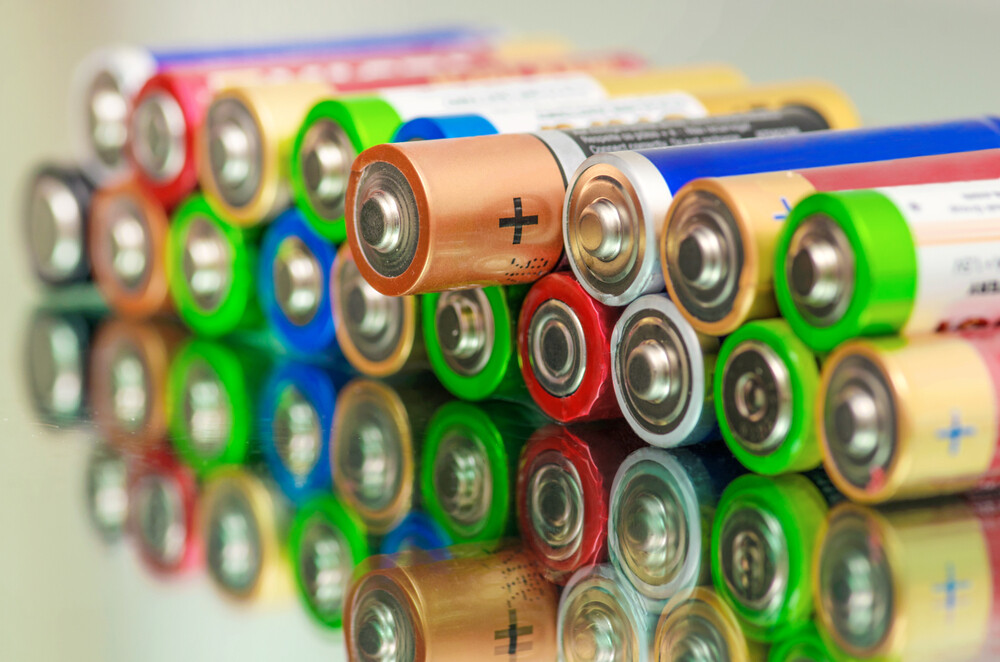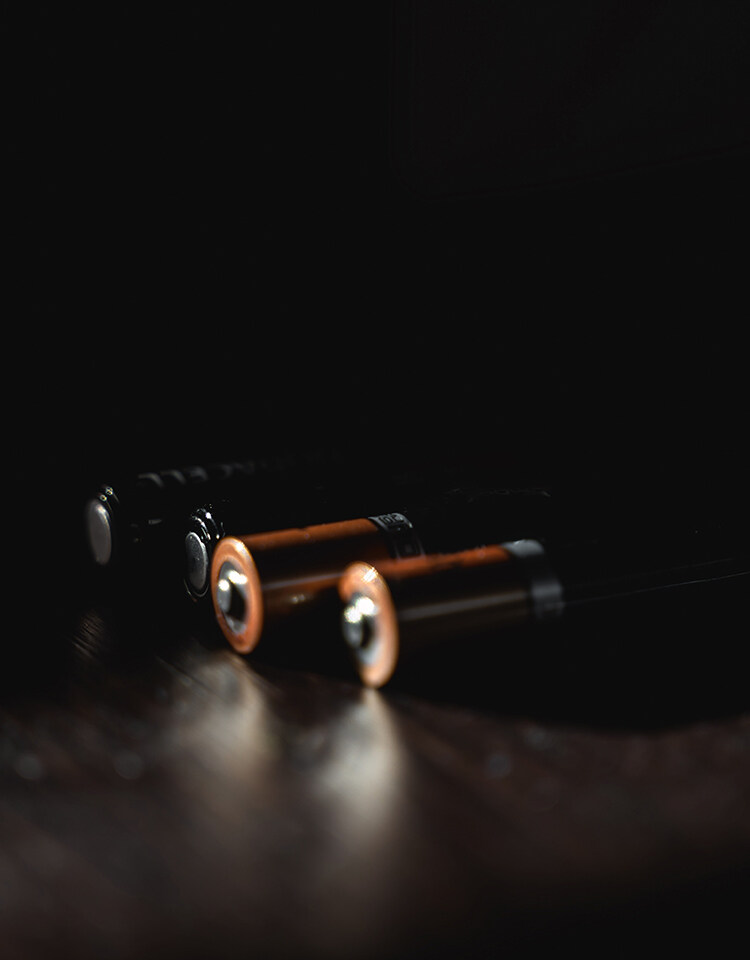Email format error
Email cannot be empty
Email already exists
6-20 characters(letters plus numbers only)
The password is inconsistent
Please enter the email address you’d like your password reset information sent to.
Email format error
Email cannot be empty
Email does not exist
Reset account password
For the account
6-20 characters(letters plus numbers only)
The password is inconsistent
Reset success
Your password was reset. You can log in using your new password.
Login

Alkaline battery & Button cell manufacturing process-News

Which is better, lithium battery or alkaline battery?
2022-04-29 11:50:59
1. The materials of lithium batteries and alkaline batteries are different.
Chemistry, performance, cost and safety are the key factors that differentiate Li-ion batteries from Alkaline batteries. The materials used to develop the batteries and the methods used to make them are also a key differentiating feature. The chemical design of alkaline batteries relies on zinc (Zn) and manganese dioxide (MnO2) as the cathode and anode, respectively, and an alkaline rather than acidic electrolyte; potassium hydroxide (KOH). They get their energy from the reaction between Zn and MnO2.
On the other hand, the design chemistry of lithium batteries relies on metallic lithium. Batteries may have different types of cathodes and electrolytes, but they all use metallic lithium as the anode. Lithium cobalt (LiCoO2), lithium titanate (Li2TiO3), lithium iron phosphate (LiFePO4), lithium manganese oxide (LiMn2O4), lithium nickel cobalt aluminum oxide (LiNixCoyAlzO2) and lithium nickel manganese cobalt nickel oxide (LiFePO4) are now available Some lithium batteries.
Lithium titanate and lithium iron phosphate have very impressive rechargeable properties. Their charge efficiency is around 90%, while their cycle endurance (100% depth of discharge cycle) is around 10,000 to 90% of capacity and around 12,000 to 80% of capacity, respectively.
Lithium iron phosphate batteries, also commonly referred to as LFP batteries, are the safest type of lithium battery on the market today. These batteries are designed in such a way that they provide a good-looking small form factor that is lightweight yet high in energy density.
Chemistry, performance, cost and safety are the key factors that differentiate Li-ion batteries from Alkaline batteries. The materials used to develop the batteries and the methods used to make them are also a key differentiating feature. The chemical design of alkaline batteries relies on zinc (Zn) and manganese dioxide (MnO2) as the cathode and anode, respectively, and an alkaline rather than acidic electrolyte; potassium hydroxide (KOH). They get their energy from the reaction between Zn and MnO2.
On the other hand, the design chemistry of lithium batteries relies on metallic lithium. Batteries may have different types of cathodes and electrolytes, but they all use metallic lithium as the anode. Lithium cobalt (LiCoO2), lithium titanate (Li2TiO3), lithium iron phosphate (LiFePO4), lithium manganese oxide (LiMn2O4), lithium nickel cobalt aluminum oxide (LiNixCoyAlzO2) and lithium nickel manganese cobalt nickel oxide (LiFePO4) are now available Some lithium batteries.
Lithium titanate and lithium iron phosphate have very impressive rechargeable properties. Their charge efficiency is around 90%, while their cycle endurance (100% depth of discharge cycle) is around 10,000 to 90% of capacity and around 12,000 to 80% of capacity, respectively.
Lithium iron phosphate batteries, also commonly referred to as LFP batteries, are the safest type of lithium battery on the market today. These batteries are designed in such a way that they provide a good-looking small form factor that is lightweight yet high in energy density.
2. Lithium batteries are lighter than alkaline batteries
Lithium batteries are much lighter than lr 44 button cell batteries. This feature provides them with advantages in portable devices such as cordless power tools, wearables, and cordless medical diagnostic tools. They also have a longer lifespan, which makes them widely used in high-tech smart devices and electronic devices where battery replacement is inconvenient.
3. Lithium battery is environmentally friendly
While lr44 cell button batteries have higher energy density, last longer than other types of batteries, and have a longer shelf life, they are prone to leaks involving potassium hydroxide. Potassium hydroxide is a corrosive agent that can cause respiratory, eye and skin irritation. Potassium hydroxide leaks in alkaline batteries also put gadgets that use the batteries at risk of permanent circuit damage, as potassium hydroxide forms potassium carbonate when the leaked potassium hydroxide absorbs carbon dioxide from the air.
Alkaline lr 44 button cell batteries are primary batteries, i.e. disposable batteries, which cannot be easily recharged after one use, and are discarded when fully discharged. Therefore, once they are fully discharged, they must be replaced. This replacement demand has increased the demand for batteries, which in turn has led to the entry of many manufacturers. This has led to an increase in counterfeit alkaline batteries on the market.
Counterfeit batteries have a similar appearance to branded alkaline batteries but do not match the performance, efficiency and leak-proof features of branded products, thereby intentionally misleading consumers. This increases the risk that alkaline batteries pose to people's health and safety.
4. Lithium batteries are more durable than alkaline batteries
One of the main advantages of lithium batteries over alkaline batteries is that they have a longer lifespan. Lithium counterparts, on the other hand, are secondary batteries, which means they can be charged to their original pre-discharge state when discharged. This is achieved by passing current through their circuits in the opposite direction of the current flow during discharge.
5. The low temperature performance of lithium batteries is better than that of alkaline batteries
Lithium batteries perform even in the most extreme temperatures, making them ideal for outdoor equipment. Lithium batteries work in extremely cold climates or extremely hot climates, and alkaline batteries stop working. The advantage of alkaline batteries is that their chemistry allows them to power everyday items like alarm clocks. However, these batteries perform very poorly in cold weather. This is because they are designed with water-based electrolytes, and extremely cold temperatures can cause ion mobility in them to decrease, which in turn slows chemical reactions in them and ultimately reduces their ability to provide electric battery power.
Lithium batteries, on the other hand, can withstand extremely low temperatures and thus can operate without failure in very cold climates. This makes them ideal for outdoor equipment applications. So you can trust them to provide the battery power you need to experience using gadgets that need to be powered, without the constraints imposed by climate change. Therefore, in situations where alkaline batteries are preferred but their performance is negatively affected by extreme cold weather, lithium batteries can be used as a high-performance alternative to standard alkaline batteries.
The above 9 volt energizer batteries, lr44 cell button battery, lr 44 button cell batteries which is better will be introduced here. I believe that through the above introduction, you should have an understanding of which is better between lithium batteries and alkaline batteries.
Contact us

